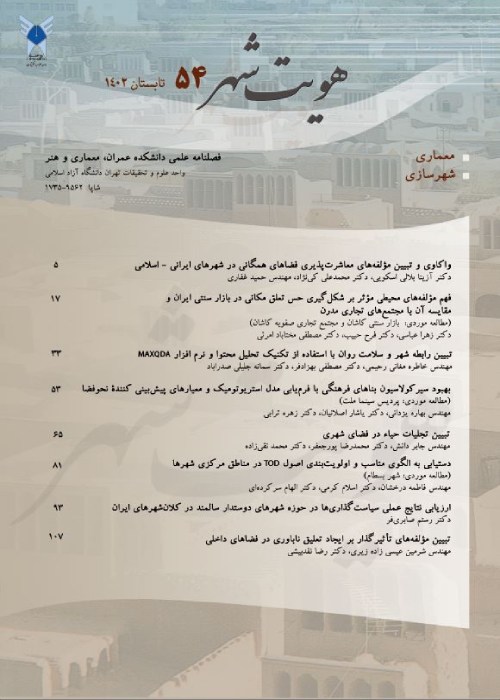Analyzing and explaining the components of sociability of public spaces in Iranian-Islamic cities (Case Study: Ali Qapu Pedestrian in Ardabil)
For the sociability of public spaces, a wide range of components are considered, but the problem that exis ts is that little attention is paid to the components based on the social norms of the Iranian-Islamic city. In examining the models presented for the sociability of public spaces in Iran, what has been less addressed by researchers is the provision of components based on the social norms of the Iranian-Islamic city. In such a way that it can be said that not much indigenous look has been done towards these components. In this regard, the mos t important goal of the current research is to analyze and explain the components affecting the sociability of public spaces and to examine their importance in the Iranian-Islamic city. The s tudy case of the research is the Ali Qapu pedes trian in Ardabil city, which is one of the mos t important Sociable public spaces of the city, which has been able to play a role in explaining the his torical and cultural identity of Ardabil. The current research is based on the purpose of the applied-developmental type and in terms of the method is of the descriptive-analytical type. The method of collecting data in this research is based on library-documentary s tudies and field s tudies in such a way that library-documentary s tudies (including books, articles and plans related to the research topic) have been used to compile the theoretical foundations. In order to inves tigate and evaluate the area of the research, field s tudies in the form of observation, interview and ques tionnaire have been used. In order to analyze the research data, after interviews and discussions and completing the ques tionnaires by 30 specialis ts in the fields of urban planning, architecture, sociology and res toration, ANP-Dematel integrated model and Spss and Super Decisions softwares were used. The research findings show that the components of "permeability", "inclusiveness", "sensory richness" and "privacy" are the mos t important components of sociability of public spaces. The final achievement of the research is the presentation of the four components of "privacy", "spatial simplification", "naturalism" and "Iranian-Islamic Facade" in the form of "value-normative" components and centered on the social norms of the Iranian-Islamic city in order to make public spaces sociable. Designers and urban planners can work more efficiently by considering these components. Components such as "Privacy" in providing a sense of peace and creating mental privacy for the users of the space, using the "Iranian-Islamic Facade" in order to show the identity of an urban space, "Naturalism" by creating greenery and freshness in the space, and "Spatial simplification" which can cause a better unders tanding and readability of the public space, they are one of the mos t important components of sociability of public spaces in Iranian-Islamic cities. Therefore, in order to design such spaces in the cities of the country, a revision should be made in the field of using their design components, and the components based on the social norms of the Iranian-Islamic city should be used in order to improve the sociability of urban public spaces.
- حق عضویت دریافتی صرف حمایت از نشریات عضو و نگهداری، تکمیل و توسعه مگیران میشود.
- پرداخت حق اشتراک و دانلود مقالات اجازه بازنشر آن در سایر رسانههای چاپی و دیجیتال را به کاربر نمیدهد.


